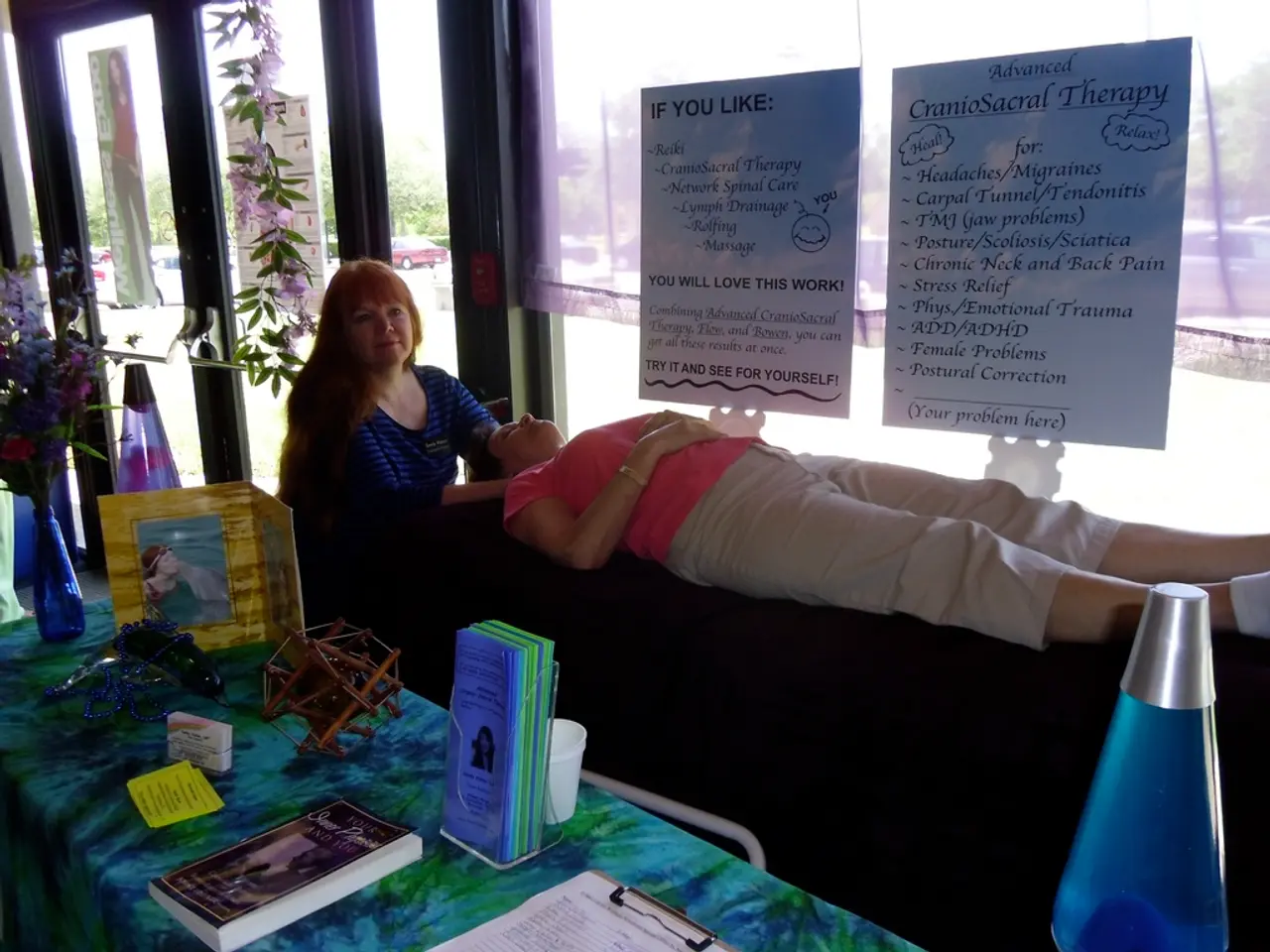Alterative treatments for managing menopause symptoms
Perimenopause, the time leading up to menopause, can bring a range of physical and emotional changes. This article provides an overview of common symptoms, natural remedies, and lifestyle changes that may help manage these symptoms.
Common symptoms of perimenopause include irregular periods, hot flashes, night sweats, mood changes, sleep disturbances, changes in libido, vaginal dryness, fatigue, body aches, heart palpitations, headaches, and weight gain [1][3][5].
Natural remedies to manage these symptoms often focus on lifestyle and dietary changes. These include stress reduction techniques like meditation and aromatherapy, maintaining a moderate weight, regular exercise, and eating a balanced diet rich in iron, calcium, and phytoestrogens (plant compounds that can mimic estrogen in the body) [2][4].
Some sources of calcium include yogurt, cheese, milk, soy milk, tofu, chia seeds, kale, broccoli, and orange juice. Vitamin D, which supports bone health in postmenopausal people, can be found in fish, mushrooms, milk, soy milk, Cheddar cheese, lentils, fortified breakfast cereals [6].
Kegel exercises can help reduce urinary incontinence, while flaxseed oil and vitamin E oil, applied to the vagina, can help improve lubrication and vaginal dryness. Vaginal moisturizers and lubricants can also help reduce pain and discomfort during sexual activity [7].
Drinking water can help reduce hot flashes and prevent recurrent infections during perimenopause. It is recommended to aim for at least 8 glasses of water per day [8].
However, it's important to note that some foods and substances may trigger hot flashes. These include alcohol, caffeine, and spicy foods [9]. Dressing in layers, carrying a portable fan, quitting smoking, and avoiding triggers can help manage hot flashes [9].
Some people may wish to try supplements to manage their weight during menopause. However, it's crucial to consult a healthcare professional before purchasing and taking weight management supplements [10]. Black cohosh, an herbal supplement, is sometimes used to treat certain symptoms of perimenopause, but it can cause side effects and interact with prescription medication [11].
Other herbal supplements that may be considered include ginseng, kava, evening primrose oil, wild yam, maca, and pollen extract, but there has not been enough research to confirm their safety or effectiveness [12]. Phytoestrogens may help reduce the chance of developing symptoms during perimenopause and reduce the frequency of hot flashes, but there is insufficient data and potential health risks associated with them [13].
In addition to natural remedies, a person should eat a healthy, balanced diet and take part in regular physical activity to manage their weight during menopause [14]. Hypnosis, cognitive behavioral therapy (CBT), biofeedback and relaxation training, mindfulness-based stress reduction (MBSR), aromatherapy massage, physical activity, weight management, eating iron-rich foods, calcium-rich foods, and vitamin D may help manage the symptoms of perimenopause, but more research is needed to determine their effects [15].
It is possible to manage the symptoms of perimenopause using natural remedies alone, but it is always a good idea for a person to talk with a doctor if they are interested in this route [16]. A person should always contact a doctor before trying any new treatments, particularly if they are taking hormonal or other prescription medications [17].
Because symptoms vary widely and can overlap with other conditions, medical evaluation is recommended if symptoms significantly affect quality of life or if irregular periods raise concerns about other health issues [1][3]. A healthcare professional may suggest HRT, antidepressants, or vaginal estrogen as medical treatment options [18].
[1] Mayo Clinic. (2021). Perimenopause. Retrieved from https://www.mayoclinic.org/healthy-lifestyle/womens-health/in-depth/perimenopause/art-20045917 [2] Healthline. (2020). Perimenopause: Symptoms and Treatment. Retrieved from https://www.healthline.com/health/perimenopause [3] NHS. (2021). Perimenopause. Retrieved from https://www.nhs.uk/conditions/perimenopause/ [4] WebMD. (2021). Perimenopause: Symptoms and Treatments. Retrieved from https://www.webmd.com/women/menopause/perimenopause [5] Cleveland Clinic. (2021). Perimenopause. Retrieved from https://my.clevelandclinic.org/health/diseases/16797-perimenopause [6] Healthline. (2019). Calcium-rich Foods. Retrieved from https://www.healthline.com/nutrition/calcium-rich-foods [7] Mayo Clinic. (2021). Vaginal dryness during menopause. Retrieved from https://www.mayoclinic.org/diseases-conditions/menopause/in-depth/vaginal-dryness/art-20047410 [8] Healthline. (2018). 7 Tips for Managing Hot Flashes During Menopause. Retrieved from https://www.healthline.com/health/menopause/hot-flashes-treatment [9] Cleveland Clinic. (2021). Hot Flashes. Retrieved from https://my.clevelandclinic.org/health/diseases/16798-hot-flashes [10] Mayo Clinic. (2021). Weight gain during menopause. Retrieved from https://www.mayoclinic.org/healthy-lifestyle/nutrition-and-healthy-eating/in-depth/weight-gain/art-20045603 [11] WebMD. (2020). Black Cohosh. Retrieved from https://www.webmd.com/vitamins/ai/ingredientmono-1138/black-cohosh [12] Healthline. (2019). 9 Natural Remedies for Menopause. Retrieved from https://www.healthline.com/health/menopause/natural-remedies-for-menopause [13] Mayo Clinic. (2021). Phytoestrogens: What You Need to Know. Retrieved from https://www.mayoclinic.org/healthy-lifestyle/nutrition-and-healthy-eating/expert-answers/phytoestrogens/faq-20058143 [14] NHS. (2021). Menopause: 10 tips for coping. Retrieved from https://www.nhs.uk/live-well/healthy-body/menopause-10-tips-for-coping/ [15] Cleveland Clinic. (2021). Menopause: Treatment & Medication. Retrieved from https://my.clevelandclinic.org/health/diseases/16797-perimenopause/treatment [16] Healthline. (2019). Managing Menopause Symptoms Naturally. Retrieved from https://www.healthline.com/health/menopause/natural-remedies-for-menopause [17] Mayo Clinic. (2021). Menopause: When to see a doctor. Retrieved from https://www.mayoclinic.org/healthy-lifestyle/womens-health/in-depth/menopause/art-20046158 [18] Cleveland Clinic. (2021). Menopause: Hormone Therapy. Retrieved from https://my.clevelandclinic.org/health/diseases/16797-perimenopause/treatment/h265161
- Perimenopause can provoke a range of physical and emotional changes, including hot flashes and night sweats.
- To manage these symptoms, one can focus on lifestyle changes like meditation, exercise, and a balanced diet rich in calcium, iron, and phytoestrogens.
- Common sources of calcium include yogurt, cheese, milk, soy milk, tofu, chia seeds, kale, broccoli, and orange juice.
- Hydration is important for reducing hot flashes and preventing infections during perimenopause; it's recommended to drink at least 8 glasses of water per day.
- Some foods and substances like alcohol, caffeine, and spicy foods may trigger hot flashes, while quitting smoking, dressing in layers, and carrying a portable fan can help manage them.
- Before trying any natural remedies, supplements, or weight management strategies, it's crucial to consult a healthcare professional.




